- Community Scenario
- Office Scenario
- School Scenario
As of 2022, Vanke Foundation has funded a total of 12 projects and sought cooperation with 9 partners. The projects cover 90 residential areas in 7 cities across the country, with over 18,0000 urban families. Nearly 700 activities have been carried out, and nearly 2,000 key volunteer residents are active in participating in sustainable community environmental construction such as garbage classification and mobilization, nature education activities, and community garden construction.
Residential communities are the homes of urban residents and important spaces for the public to seek for a green and beautiful life. In the past five years, in urban communities, Vanke Foundation has directly or indirectly collaborated with 14 partners to support 23 projects, covering 32 provinces, autonomous regions, and municipalities directly under the central government, and 121 communities in 22 cities. By exploring and summarizing zero-waste action paths in different urban communities, we not only promote nearly 300,000 people to implement garbage sorting actions in their daily lives at their doorstep, but also combine the achievements of household waste management with the significance of dual carbon construction, making more people understand the important value of their "little effort" for the green future we are jointly yearning for.
Vanke Foundation has funded a total of 12 projects
Nearly 700 activities have been carried out
2,000 residents volunteered
Since 2018, Vanke Foundation has been demonstrating the in-situ kitchen waste treatment with Hermetia illucens in Xishan Courtyard Community, Beijing. After learning from the composting model of the Bangalore community in India, the Foundation introduced Hermetia illucens breeding and green waste composting technology and explored a nature-based waste solution. At present, it has been successfully operated for more than four years, reducing about 30% to 40% kitchen waste, and an average of about 100 kilograms of food waste every day in the community. Most of the waste is recycled in-situ.
Beijing Xishan Courtyard "Sustainable Community" project, led and funded by Vanke Foundation, in collaboration with partners such as CanFit, Vanke Property, and Evergreen Sustainable Development Center, creates a model of organic waste reduction and resource recycling in communities while advocating "source reduction". By building an immersive experience and education center for in-situ treatment of kitchen waste, it enhances residents' participation in garbage classification with community activities as a link and generates carbon benefits.
Xishan Courtyard Community is the earliest garbage classification demonstration unit in Beijing. It explores a three-in-one "zero-waste" sustainable path in the community, namely "source reduction and garbage sorting, integrated in-situ kitchen waste and garden waste recycling, and utilization of recycled products such as organic matter returning to soil". The project is equipped with garbage sorting stations, in-situ transformation of kitchen waste with Hermetia illucens, in-situ composting of insect and green plant waste, aquaponics, community ecological gardens, green space maintenance, and ecological civilization promotion.
As of 2022, the permanent residents of Xishan Courtyard Community is 2,000, with a green coverage rate of 31%. 30% household waste has been reduced in garbage sorting. 130 volunteers have participated in community services, and over 300 visitors have visited and studied the community. A total of 6,579 residents have directly participated in community building activities; The project was awarded "Beijing Municipal Household Waste Management Commitment Award" and "Beijing Municipal Household Waste Classification Demonstration Community"; According to the professional carbon accounting institutions, the Xishan Courtyard Sustainable Community Project can reduce CO2e emissions by 114.88 tons per year, equivalent to planting 1,149 trees.
In the future, we hope to build Xishan Courtyard a sustainable and vibrant ideal community by developing and applying more green technologies such as environmental protection and energy.
-
31%
With a green coverage rate of 31%
-
30%
30% household waste has been reduced in garbage sorting
-
300+
over 300 visitors have visited and studied the community
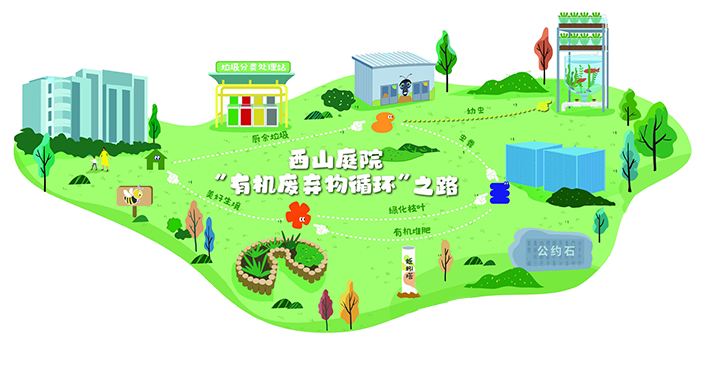
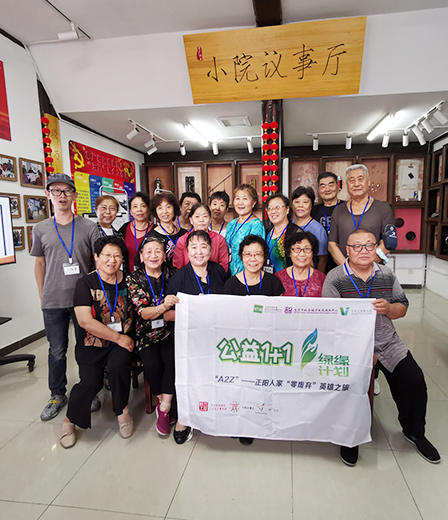
Through the “Five Social Linkage”' mechanism, we aim to build a new public welfare ecosystem that involves resource sharing, partner interdependence, and value co-creation among multiple parties. Phase I has funded 21 social organizations to carry out community environmental protection actions. Phase II will continue to support 17 social organizations and community social organizations in Beijing to carry out work in 26 communities.
On November 29, 2022, Green Empowerment Plan held a “Project Experience Exchange Meeting and 'Five Social Linkages' Forum to Promote Sustainable Community Environment Construction”, and released the Empowering Social Organizations to Assist in Sustainable Community Environment Construction - Green Empowerment Plan Action Research Report of “Public Welfare 1+1”. The research finds that the trust and respect based service concept, the funding model with equal emphasis on resource support and capacity building, and the collaborative mechanism of multiple parties involved in the five social organizations are helpful to support and promote social organizations to participate in community environmental protection.
Entering the second phase, the Green Empowerment Plan continues to support 17 social organizations and 26 communities in Beijing to carry out sustainable community environmental construction - emphasize both empowerment and funding, support local social service institutions in Beijing to enhance their capacity for sustainable community environmental construction, tap into local wisdom, innovate local practices, and promote the sustainable community work such as waste classification and reduction in Beijing; Further cooperate with grassroots governments to explore experience of regional pilot communities; Summarize the experience, path, and policy recommendations of social organizations in building sustainable community environment in Beijing, which take the participation of social organizations in social governance as the starting point and stimulating the endogenous power of communities as the core.
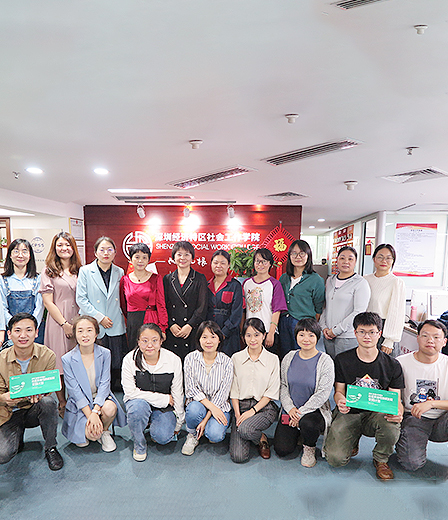
By studying the status quo of Shenzhen community environment and the participation of social organizations, we aim to promote community sustainable development projects and cultivate green social workers, construct a green community action system, and summarize and export the "Shenzhen experience" in creating green communities and waste-free cities. Research Report on the Status Quo of Sustainable Construction of Shenzhen Community Environment was released in March 2022. The project has supported 15 social organizations to carry out various activities in 20 residential areas in Shenzhen, and published courses at the "Social Work Course" for licensed social workers.
Office Scenario
Most office workers spend about a third of their five-day working week in the office, and naturally there are various types of garbage that come with it. Office waste is characterized by large quantity and complex composition, making it difficult to reduce and sort waste. How to encourage white-collar workers to become actors in garbage sorting? Since 2018, Vanke Foundation has jointly launched the Office Zero-Waste Action with Vanke Group. By summarizing practical experience and drawing on excellent zero-waste cases in office scenarios of other domestic institutions, it has developed tools, and promoted and empowered enterprises nationwide in collaboration with partners. It looks forward to promoting every "worker" to become a green actor in his/her own office space.
Mass Action
In 2019, Vanke Group began the office zero-waste action under the guidance of Vanke Foundation. By continuously deepening environmental protection concepts and zero-waste actions, upgrading the garbage bins and equipment of centralized garbage disposal points in the offices, and continuing to carry out zero-waste environmental protection activities, it have achieved a 90% effective rate of garbage classification in Vanke headquarters' Samsung office park, a 97% participation rate of group employees in garbage classification, and a 95% awareness rate of garbage classification knowledge. The kitchen waste, dead branches and leaves in the park have been recycled in-situ, achieving an annual output of 19.7 tons of organic humus from composting, and continuously nourishing the green plants in the office and the park. In 2022, Vanke Group was awarded the title of "Green Unit for Household Waste Classification" by the Shenzhen Municipal Household Waste Classification Management Center.
In August 2021, Vanke Foundation summarized its practical experience in promoting Vanke Group's zero-waste office, as well as good practices of other domestic institutions that can be used for reference, ie. New Zero-Waste of Office - Zero-Waste Office Action Guide, encouraging more organizations and institutions to join in promoting zero-waste office.
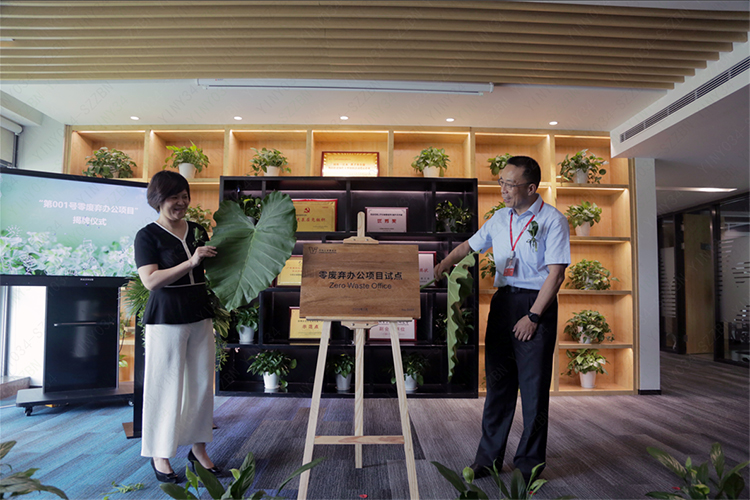
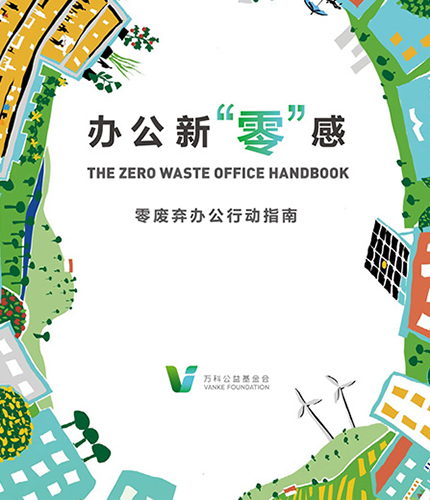
Zero-waste Venture Plan
In February 2022, Vanke Foundation and Shenzhen Duckgaga Public Welfare Culture Promotion Center launched the "Zero-waste Venture Plan" to provide technical support and operation guidance for enterprises nationwide to implement zero-waste in offices. The project attracted zero-waste industry experts to form a team of zero-waste office experts, recruited 21 joint promotion partners, and influenced more than 50,000 person-times of 387 enterprises (organizations) to pay attention to and practice zero-waste by releasing the zero-waste office action, producing zero-waste office promotional videos, customizing the list of zero-waste office action of enterprises, organizing online special lectures, and other forms. It also provides six zero-waste office seed companies nationwide, including Novo Nordisk (China) Pharmaceuticals Co., Ltd., Hualong Shengai Traditional Chinese Medicine Group, CHIT SING HOLDINGS LIMITED, Ping An Trust Co., Ltd., Zhejiang Century Huatong Group Co., Ltd., and Mengniu Dairy, with one-on-one zero-waste practical guidance for six months, creating a benchmark for zero-waste office.
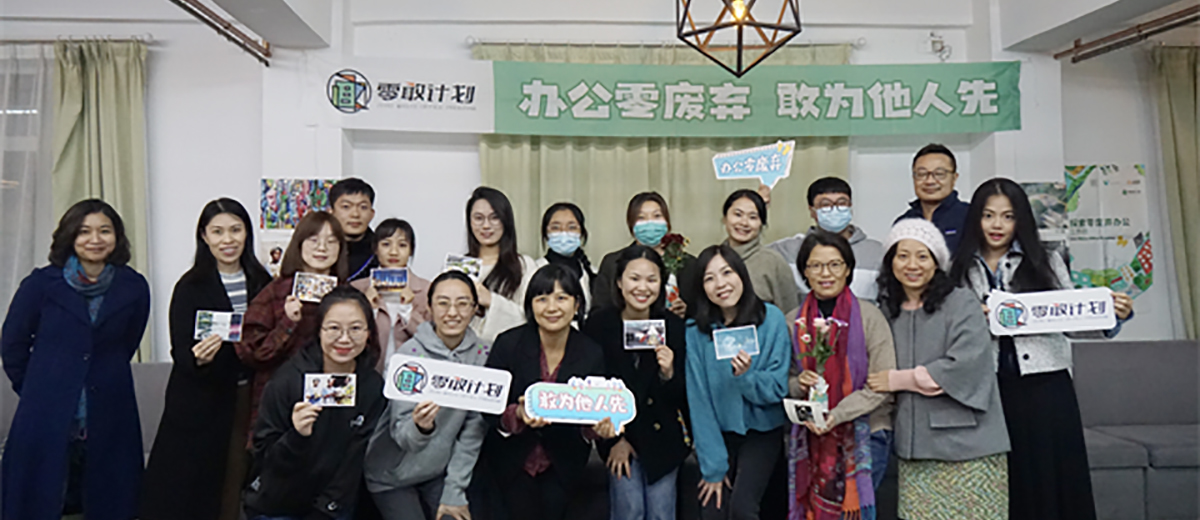
School Scenario
Children are the future of society, playing a key role in disseminating and practicing the zero-waste concepts more widely. Vanke Foundation drives young people to effectively understand garbage classification in school settings through "point-surface" dimensions such as campus action pilot projects, research and development of campus zero-waste guidelines, and national campus promotion. Through various zero-waste campus activities, it encourages children to transform the zero-waste concept into green actions in their own learning and life.
Dandelion Campus Action Plan
In July 2018, Vanke Foundation and Urban Management and Law Enforcement Bureau of Shenzhen Municipality jointly launched the garbage classification "Dandelion Plan". Over the past four years, the Dandelion Plan has formed a series of projects for public education - Dandelion volunteer lecturers and school education - Dandelion teacher training. Dandelion volunteer lecturers and teachers have become an integral part of Shenzhen's garbage classification industry. In May 2021, the Urban Management and Law Enforcement Bureau of Shenzhen Municipality, in collaboration with the Shenzhen Education Bureau, issued the Notice on Issuing the Implementation Plan for Creating a Dandelion Campus for Household Waste Classification. By creating dandelion campuses throughout the city, a long-term mechanism for waste classification school education was established, providing model demonstrations for waste classification undertakings across the country. In 2022, the second phase of the dandelion teacher training project for household waste classification in Shenzhen trained 50 in-service teachers of primary and secondary schools and kindergartens. About 15 teachers were selected for intermediate advanced training in the first phase to gradually form a dandelion teacher team echelon. That being said, the training course system and management system for dandelion teachers in garbage classification in Shenzhen were exported to empower and support training dandelion teachers throughout Shenzhen in a standardized manner.
Just like the name "dandelion", dandelion teachers have "flown" into different schools, exploring effective publicity and education models, and continuously promoting garbage classification on campus. With these actions taken, the seed of "environmental protection" has also taken root and sprouted in the hearts of children.
As of the end of 2022, the Dandelion Campus Action Plan has trained nearly 2,000 primary and 13 intermediate teachers in the city, cultivated 10 famous teachers, and set up dandelion campuses in 1,669 schools. Empowered by technological innovation, it has created a campus "environmental bank" smart platform, launched the "Milk Box Resource Recycling Action", and established an innovative model of "recycling+practice" for campus garbage classification, influencing over 1,200 schools and 96,0000 students and families. More than 1,800 schools are using the "Environmental Bank" smart platform, and children's awareness of garbage classification is constantly improving, creating a new brand of garbage classification education on campus in Shenzhen.
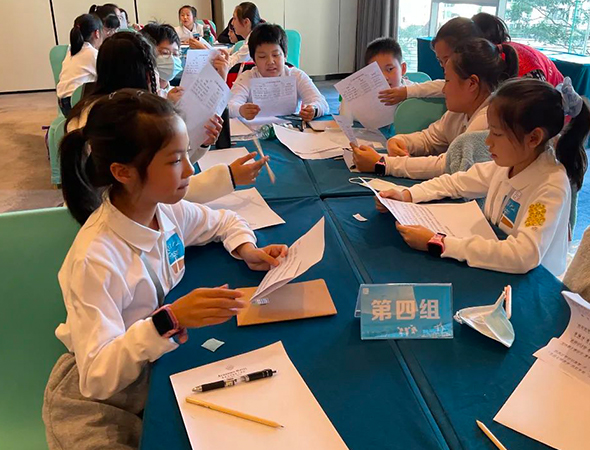
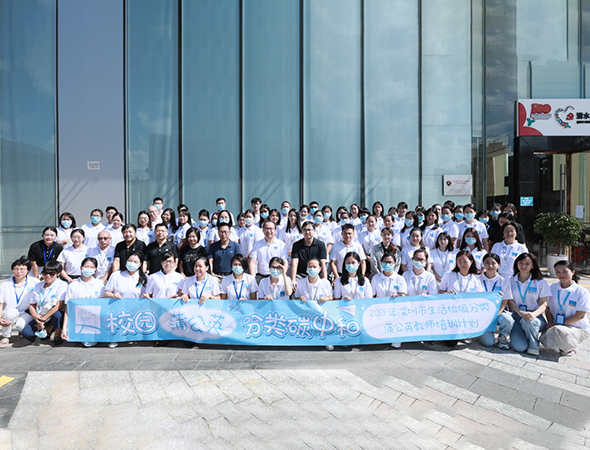
Special Promotion and Practice Plan for the Guidelines for the Construction of Zero-Waste Schools
In 2021, Vanke Foundation funded Friends of Nature and collaborated with Shanghai Weiai Education to jointly release the Guidelines for the Construction of Zero-Waste Schools (hereinafter referred to as the Guidelines). In 2022, in order to provide more detailed and targeted course plans for primary and secondary school teachers to use the Guidelines, and to promote more kindergarten teachers to guide children to practice zero-waste actions, Vanke Foundation funded the Beijing Roots and Shoots Community Youth Service Center (hereinafter referred to as Beijing Root and Shoots) to implement the special promotion and practice plan of the Guidelines for the Construction of Zero-Waste Schools.
In 2022, the Guidelines received a total of 166 applications from 23 provinces/cities and conducted two online training sessions; Selected a total of 20 practical plans from 9 cities; A total of 11 schools from 9 provinces, autonomous regions, and municipalities across the country conducted practical activities with an average of over 130 class hours; A total of 4 online themed training and sharing sessions were conducted offline and online, with over 300 participants. The Guidelines has also been widely used in more than 10 schools, including Meisha Outdoor Education, Meisha Yuanhang School, and Shenzhen Dandelion Campus.
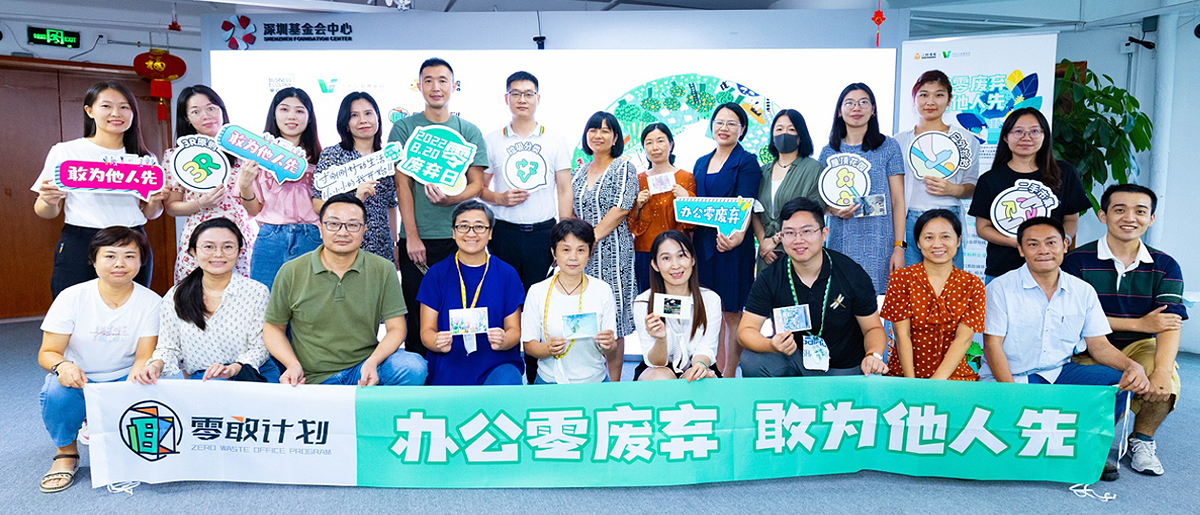

Back
